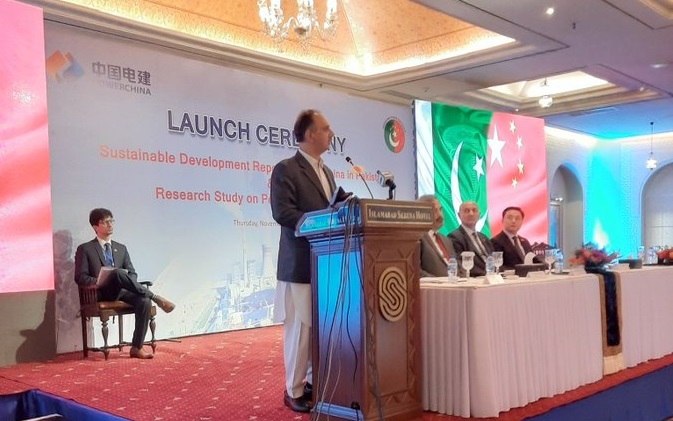Under CPEC, Pakistan to provide transit route to Chinese rare earth metal imports
Minister for Energy Omar Ayub Khan in his keynote speech said Pakistan's energy sector has the capacity of obtaining $120-$130 billion investment. He said due to Chinese interest in the energy sector of Pakistan now, countries like Japan and Denmark also relocating their renewable energy manufacturing plants in Pakistan. He linked China-Pakistan Economic Corridor-I with the construction of Karakoram Highway (KKH), along with building Heavy Mechanical Complex, Heavy Electrical Complex, Kamra Rebuild Factory and Heavy Industries Taxila. Omar Ayub stated today we are not reinventing the CPEC wheel rather putting ideas in fresh technology, perspective and bringing opportunities in the country. He also described that China manages almost all of the global rare earth metals industry and imports a significant amount from Africa and Pakistan could play the role of transit route and get benefitted.
ISLAMABAD (Web Desk) – Minister for Energy Omar Ayub Khan Thursday said that Pakistan was an attractive destination for foreign investors and its petroleum and energy sector alone had the potential of around $120-130 billion investment.
“The good thing is that investment has started rolling in, as countries like China, Japan and Denmark are relocating their manufacturing capabilities in Pakistan’s large renewable energy, photovoltaic cell technology and windmills sectors,” he said while addressing the launching ceremony of Sustainable Development Report of PowerChina in Pakistan and Research Study on Port Qasim Power Plant here.
He said around 8,000MW and 20,000MW clean, environment-friendly and cheap Renewable Energy (RE) would be added to the system by 2025 and 2030 respectively under the new Alternative Renewable Energy Policy 2019 approved by the Federal Cabinet.
The minister said the country’s installed power capacity by 2030 would stand at 55,000MW, out of which 60 percent would be from clean and green energy, domestic energy, adding “as many as 30 percent will be from renewable energy, 30 percent from hydel, 10 percent from coal and 10 percent from nuclear. When combined 80 percent will be from indigenous resources.”
He underlined the need for producing high quality and technical workforce to meet needs of the contemporary world.
Highlighting historic relations between the two countries, he said in past the CPEC-I did happen in the form of Karakoram Highway (KKH), and its close proximity Pakistan had established Heavy Mechanical Complex, Heavy Electrical Complex, Kamra Rebuild Factory and Heavy Industries Taxila.
He said : “So, we are not reinventing the wheel but now entering a new phase of China Pakistan Economic Corridor (CPEC). When we talk about One Belt One Road Initiative, it means about energy connectivity and creating jobs.”
“We are taking these ideas, putting in fresh technology perspectives and creating opportunities, to a point where a country like Pakistan is going to be the gateway, through which all energy resources and trade would flow to other parts of the world”, he added.
He said China was importing all its rare earth metals from Africa and surrounding regions and “today China has 96 percent control of global supply and production of rare earth metals, and guess from where they [the metals] would go now – definitely through Pakistan. ”
Speaking on the occasion,Chinese ambassador Yao Jing said the Port Qasim Power Plant was a success story of cooperation and implementation of the CPEC projects.
“The CPEC, after the five-year implementation with the joint efforts from both the Pakistani and Chinese governments, has started achieving tremendous progress in various sectors, especially energy and development of transport infrastructure.”
The envoy also focused on the Phase-II of CPEC, saying that Phase-I was already a “success story”. He lauded the strong bonds of friendship between Pakistan and China.
Chairman Pakistan-China Institute Mushahid Hussain Sayed thanked the PowerChina for launching the first major CPEC power project at Port Qasim, which ensured employment opportunity to thousands of people.
Talking about his recent visit to the Port Qasim Power Plant, he said said the smoke emitted from Port Qasim Power Plant was white in colour unlike the other power plants which emitted dark smoke.
He said the PowerChina had empowered Pakistan’s energy independence and the long-standing issue of chronic energy shortages and load-shedding had been controlled.
Chinese envoy Zhao Shiren urges students to uphold integrity and strengthen China-Pakistan ties
LAHORE:The Consul Generals from several countries and other distinguished guests attended …











